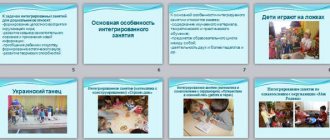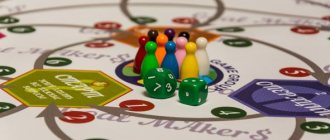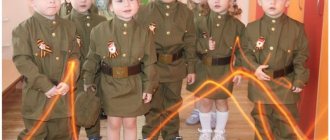Self-education topic: “Game as a leading activity for preschool children”
Self-education topic: “Game as a leading activity for preschool children”
Play as a type of human activity has long attracted the attention of teachers, psychologists, philosophers, biologists, and sociologists. A game is a special type of human activity. Scientists study the games of children and adults, looking for their specific and distinctive features.
Play is not empty fun, but a very important activity for a child.
A child’s development largely depends on what and how he plays.
Between the ages of three and seven years, play becomes the leading activity in a child’s life and acquires a distinct plot-role character.
Relevance of the topic:
The main activity of preschool children is play. During the game, the child’s spiritual and physical strengths develop: his attention, memory, imagination, discipline, dexterity, etc. In addition, play is a unique way of learning social experience, characteristic of preschool age.
In the game, all aspects of the child’s personality are formed, significant changes occur in his psyche, preparing the transition to a new, higher stage of development. This explains the enormous educational potential of play, which psychologists consider the leading activity of a preschooler. Play for preschoolers is a way of learning about their surroundings. While playing, he studies colors, shapes, properties of materials, plants, and animals. Through play, a child enters the world of adults, masters spiritual values, and assimilates previous social experience. In the game, the child receives for the first time a lesson in collective thinking.
Tasks:
1.Increase your own level of knowledge by studying the necessary literature
2.Study the psychological and pedagogical characteristics of children
3.Study the features of organizing gaming moments in a group
4. Creating conditions for emotional well-being through gaming activities.
In the context of the implementation of the Federal State Educational Standard, children are taught through play, since play constitutes the main content of the life of a preschool child and is his activity. It activates the child’s mind and will, deeply affects his feelings, increases the vital activity of the body, and promotes physical development. Play is necessary for a child to grow up healthy, cheerful and strong.
Long-term work plan for 2020-2021
November
Development of didactic material for the game “Shop”. Development of a summary of the open lesson “Shop” for participation in “YarProfi”
December
Development of play activity in preschool children. Work on the topic “Classification of theatrical games”
Selection of material on the topic. Through various forms of theatrical play, improve moral and communicative qualities, creative abilities, and mental processes. Working on creating methodological folders. Selection of material. Gaining experience.
Development of a game project for the role-playing game “Mothers and Daughters”
January
Working on creating methodological folders. Selection of material. Gaining experience. Development of a game project for the role-playing game “Mothers and Daughters”. Internet resources. To develop in children the ability to play the role-playing game “Children's Cafe”.
February
Development of a developmental manual “Seasons: Tree”. Selection of material. Internet resources. Familiarizing children with seasonal changes in nature, consolidating counting, number composition, color, and developing fine motor skills. Development of a card index. “Games for uniting children’s teams.” Selection of materials. Learn to establish trusting contact with each other, provide mutual assistance, and listen to your partner’s opinion.
March
Studying methodological literature. “Fun games in the kindergarten area.” Reading literature, selecting material. To form a system of consciously correct ecological ideas about nature. Work on a card index of games for speech development. Selection of material Development of intellectual abilities.
April
Development of a didactic game “Daughters - Mothers”. Internet resources. To consolidate and systematize children’s ideas about the family. Development of card files: outdoor games; role-playing games; finger games; didactic games. Selection of material. Comprehensive development of the child.
May
Work on a card index of didactic games on moral education.
Selection of methodological literature. To form an idea of the family, the world around us, and our small homeland. Developing a self-education plan for the new academic year. Selection of methodological literature
Self-education plan on the topic of play as a means of child development
Natalia Veselova
Individual plan for self-education “Game as a means of developing the personality of a preschooler”
Relevance
It is not for nothing that the game is called “leading” - it is thanks to it that the child gets to know the world of objects and people around him, enters the world of social relations, the community of adults. Through play, a child learns about himself and his capabilities. “ A game is a spark that ignites the flame of inquisitiveness and curiosity,” noted V. A. Sukhomlinsky.
The main activity of preschool children is play . In the process of play, develop : his attention, memory, imagination, discipline, dexterity, etc. In addition, play is a unique , characteristic of preschool age.
In the game, all aspects of the child’s personality , significant changes occur in his psyche, preparing the transition to a new, higher stage of development . This explains the enormous educational potential of play, which psychologists consider the leading activity of a preschooler . Play for preschoolers is a way of learning about their surroundings. While playing , he studies colors, shapes, properties of materials, plants, animals. Through play, a child enters the world of adults, masters spiritual values, and assimilates previous social experience. In the game, the child receives for the first time a lesson in collective thinking.
One of the tasks of a preschool educational institution is to create harmonious conditions for the development of gifted children, taking into account intellectual, mental, physical and age characteristics and the desire to acquire new knowledge in a particular area. Parents believe that children with a high level of intelligence should reveal their full potential, however, it is important to note that many different additional activities and clubs do not give the child the opportunity to be a child, since the parents’ high standards do not leave children time to play with their peers.
In the context of the implementation of the Federal State Educational Standard, children are taught through play, since play constitutes the main content of the life of a preschool and is his activity. It activates the child’s mind and will, deeply affects his feelings, increases the vital activity of the body, and promotes physical development . Play is necessary for a child to grow up healthy, cheerful and strong.
Play is a special activity that blossoms in childhood and accompanies a person throughout his life.
In play, a child develops as a personality ; he develops those aspects of his psyche on which the success of his social practice will subsequently depend. The game is a testing ground for children’s social tests, that is, those tests that children choose for self-test and during which they master ways to solve problems of interpersonal relationships . The game creates the basis for a new leading activity - educational. Therefore, the most important task of pedagogical practice is to optimize and organize a special space in preschool education to activate, expand and enrich the play activity of a preschooler .
Play is the most accessible type of activity for children; it is a way of processing impressions and knowledge received from the surrounding world.
Preschool age is the initial stage of assimilation of social experience. A child develops under the influence of upbringing, under the influence of impressions from the world around him. He develops an early interest in the life and work of adults. Play is the most accessible type of activity for a child, a unique way of processing received impressions. It corresponds to the visually figurative nature of his thinking, emotionality, and activity.
The joy of play is the joy of creativity. Already in his first games , the child experiences satisfaction from fulfilling his plans. Many games give children the joy of satisfying their need for movement and imitation. Kids also enjoy the process of constructing a structure from building material - or from sand; at the same time, the joy from the results of the efforts made, the manifestation of independence , and imagination is noticeable. It is necessary to organize the game in such a way that it is joyful in all respects.
The understanding of play as a form of organizing the life and activities of children is based on the following provisions.
1. The game is designed to solve general educational problems, among which the tasks of forming the moral and social qualities of the child are of primary importance.
2. The game should be amateur in nature and increasingly develop in this direction, subject to proper pedagogical guidance. The educator must provide for the formation in children of positive real relationships and morally valuable relationships determined by the role.
3. An important feature of play as a form of life for children is its penetration into various types of activities : work and play , educational activities and play , everyday household activities associated with the implementation of the regime and play .
Target:
Creating conditions for active and independent creative activity, forming positive interpersonal relationships in the child during the game.
Tasks:
— Determining the role of play in organizing children’s life activities.
— Development of intellectual abilities in children through
application of gaming technologies.
— Creating conditions for psychological and physical health
through play activities.
— Creating conditions for emotional well-being through gaming
activity.
— Actively influence the comprehensive development of children through
gaming activity.
1. Expected results
Children must learn to control their behavior, independently select or invent a variety of game plots, and maintain interest in different types of games. Children should develop an interest in play , initiative, and organizational skills.


